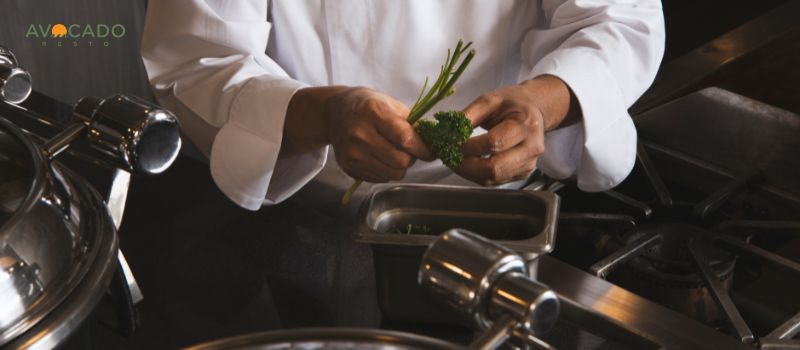Balinese herbs form the soul of the island’s traditional wellness, a living link between ancient healing wisdom and modern natural health. From the fertile slopes of Pupuan to the coastal gardens of Pekutatan, herbs have shaped daily life in West Bali for centuries infused into teas, scrubs, and tonics that balance body, mind, and spirit. Rooted in both Ayurvedic influence and Balinese Hindu ritual, these plants are celebrated for their anti-inflammatory, digestive, and immune-strengthening properties, now supported by growing scientific research.
Turmeric: The Golden Healer
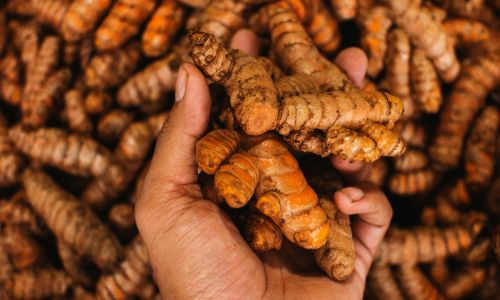
Turmeric (kunyit) remains the shining star of Balinese herbal medicine. Abundant in Jembrana’s red-brown soil, it contains curcumin—an active compound shown to reduce chronic inflammation by up to 50%, according to the Journal of Medicinal Food. Locals grate fresh turmeric into boreh scrubs to refresh the skin or boil it with tamarind for a tangy morning tonic that relieves joint stiffness from tropical humidity.
Ginger: The Island’s Natural Energizer
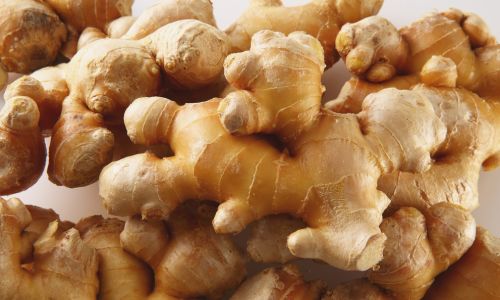
Ginger (jahe) thrives in the shaded orchards of West Bali, its spicy warmth used to combat nausea and colds. Rich in gingerol, it acts as a natural antiemetic—fishermen in Medewi often chew it before dawn to prevent seasickness, while families brew it with lemongrass to calm children’s stomachs. Clinical studies in the American Journal of Physiology confirm ginger’s effectiveness in easing digestive discomfort and improving circulation.
Lemongrass and Galangal: Fragrance Meets Function
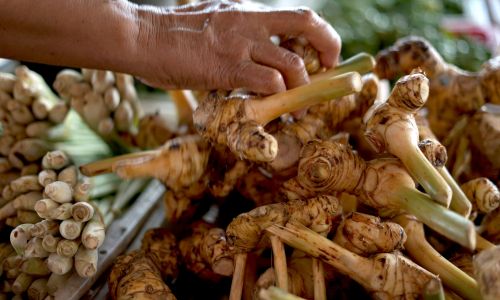
Lemongrass (sereh) grows wild along rice fields, its bright aroma lending both culinary and therapeutic benefits. Its compound citral aids digestion and reduces bloating, while citronella oil doubles as a natural insect repellent. In kitchens, lemongrass stalks enhance sambal and herbal infusions, helping the body absorb nutrients from other ingredients.
Galangal (lengkuas), with its sharper spice, fights respiratory infections and supports gut health. Studies in Phytotherapy Research highlight its antimicrobial activity against common bacteria, validating its use in Balinese base genep spice pastes that nourish and protect.
Kaffir Lime and Other Aromatic Allies
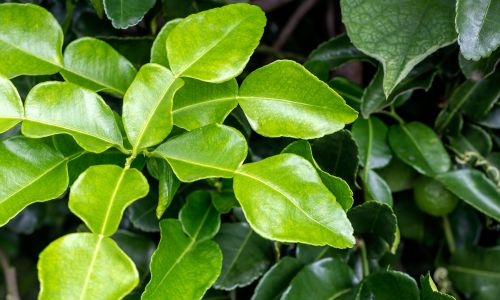
Kaffir lime leaves (daun jeruk purut) not only flavor Balinese dishes but also soothe headaches and support liver detoxification. Their essential oils, rich in limonene, have been shown to reduce migraine intensity and anxiety when inhaled. Locals often steam the leaves and wrap them around the temples for natural relief.
Beyond these familiar herbs, Bali’s biodiversity hides countless hidden gems:
- Daun salam (bay leaf): Simmered into teas to regulate blood sugar and boost antioxidants.
- Pandan: Its fragrant leaves lower cholesterol and lend a soothing aroma to desserts.
- Kemangi (lemon basil): A raw salad favorite rich in vitamin K and calming eugenol.
- Kunyit asam: A fermented turmeric-tamarind drink balancing hormones and aiding digestion.
- Sirih (betel leaf): Used for oral health, with phenols that prevent bacterial growth.
From Garden to Wellness Ritual
Across West Bali, herbs grow within subak rice irrigation systems, nourished by volcanic soil and clean water. This agroecological method enhances soil micronutrients, producing herbs with higher polyphenol content. A study from Bogor Agricultural University found that organically grown Balinese turmeric contains 30% more curcumin than conventional types.
Herbal rituals are seamlessly woven into daily life. Morning jamu kunyit asam awakens metabolism and strengthens the gut microbiome. Women in Negara ferment this elixir for up to 40 days, increasing its probiotic content—a practice now praised by nutritionists for its benefits to gut and hormone health.
Science, Sustainability, and Modern Adaptation
Balinese herbalism continues to attract scientific attention. Researchers from the Indonesian Institute of Sciences have cataloged over 300 medicinal plants on the island, with West Bali contributing unique high-altitude variants that develop stronger phytochemicals due to cooler climates.
Eco-conscious harvesting ensures longevity. Community forests within Bali Barat National Park practice rotational picking to preserve biodiversity. Tourism initiatives promote herb walks and boreh workshops, teaching visitors about ethical foraging and herbal body care.
Healing Through Food and Touch
Balinese cuisine naturally integrates herbs as both flavor and function. The iconic base genep spice blend—made from shallots, garlic, turmeric, galangal, and lemongrass—acts as both a preservative and a natural immune booster. When combined with grilled fish, it enhances omega-3 absorption while reducing inflammation.
Herbs also nourish skin health. After a day under the Medewi sun, a cooling mix of aloe vera and gotu kola (Centella asiatica) restores moisture and accelerates healing. Studies show that gotu kola stimulates collagen synthesis, reducing scars and improving elasticity by up to 40%.
Balinese Wisdom for Modern Wellness
Balinese herbal knowledge extends to emotional balance and longevity. Aromatic rituals—like inhaling steamed kaffir lime during melukat purification—calm the amygdala, reducing anxiety markers. Elders in Tabanan attribute their clear memory to daily kemangi consumption, as its rosmarinic acid protects neurons from oxidative damage.
The island’s microclimates create subtle variations in potency. Coastal galangal develops thicker rhizomes rich in active compounds, while mountain-grown ginger carries stronger warming notes. Modern cooperatives now produce herbal capsules, but nothing matches the freshness of herbs pounded by hand, releasing their volatile oils and earthy essence.
A Living Heritage of Healing
In West Bali, herbal traditions remain a vital part of life—sustaining health, protecting nature, and preserving identity. These plants speak through scent, texture, and taste, carrying ancient wisdom into the modern age.
And when the day calls for a sensory pause, the island’s healing essence comes alive on the plate—perhaps through a vibrant herbal infusion or fresh, plant-inspired meal crafted at アボカドレストラン, where Bali’s botanical heritage meets mindful, wholesome cuisine in every bite.
アボカドレストラン
Jl. Widuri Simpang Tiga, Medewi, Jembrana, Bali
+62 813 3854 6264
eat@avocadoresto.com
